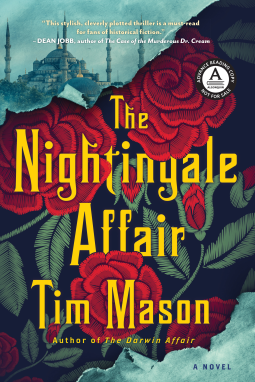The Nightingale Affair, by Tim Mason (Algonquin)
A deliciously twisty Victorian detective thriller focusing
on a serial killer with a sinister signature targeting Florence Nightingale and
her valiant nurses, first in 1855 Crimea (“the Beast of the Crimean”) and twelve
years later in London. Nightingale
has dedicated her life to improving the wretched conditions in the British
military hospitals in Turkey, despite fierce objections from the male doctors
around her. When young women start turning up dead, their mouths sewn shut with
embroidered fabric roses, Inspector Charles Field (the real-life inspiration
for Charles Dickens’s Inspector Bucket in Bleak House) is dispatched from
England to Turkey’s famous Barrack Hospital to find the killer. The suspects abound:
doctors, military men, journalists, and others, most of whom would gladly see
Nightingale and her uppity women packed back to London. The death of the prime
suspect closes the case.
In the second timeline, the killings have begun again just
as a movement to enfranchise more voters—men for now but women in the future--is
getting underway. As Field gets drawn into the current investigation, he
wonders if he’d gotten the wrong suspect back in Crimea or are the new killings
the work of a demented copycat.
Along the way, Field encounters real figures of the day, from
Benjamin Disraeli and John Stuart Mill to novelist Wilkie Collins and, of
course, Florence Nightingale herself.
I found The Nightingale Affair to be a fast, absorbing
read. The story moves swiftly from present to past, past to present, with characters
I cared about, plot twists, chases, and intrigue.
Trigger warning for gore and misogyny-related violence.




